On 12 December 2023, the International Federation of Accountants (IFAC) and Chartered Professional Accountants of Canada (CPA Canada) convened policymakers and regulators with the accountancy and legal professions for a global event to launch their new report Understanding Whistleblower Protection: Laws, Practices, Trends and Key Implementation Considerations.
Download the Report
The event, Beyond Silence: Understanding the Evolution of Whistleblower Protection Laws from the Accountancy Profession’s Perspective, was attended by over 340 live participants from over 130 jurisdictions.
Experts discussed the role of whistleblowers and how they can help address some of the most serious issues facing society. They also explored the positive legislative improvements in whistleblower protection in various jurisdictions and opportunities for further enhancement.
The lively exchanges confirmed that widespread gaps remain between adoption and implementation worldwide, and progress in strengthening whistleblower protection continues to be a challenge. Whistleblowers continue being prosecuted, sued, and fired. At the same time, our understanding of the costs of not protecting whistleblowers is becoming increasingly clear.
Several key themes emerged from the discussion to address these challenges:
- Collaboration and involvement of all stakeholders: no one can do this alone;
- Courage, vision and leadership in business and governments; and
- Cultural transformation--we need a mindset reset to build the foundations for a sustainable future.
Watch the full recording of the webinar
Understanding Whistleblower Protection
Image
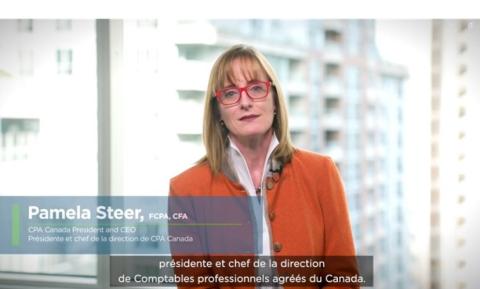
Pamela Steer, President and CEO of CPA Canada in her welcoming remarks, said: “Whistleblowers play a pivotal role in exposing financial wrongdoing and economic crimes. Their protection has consequently emerged as a policy priority to safeguard and encourage whistleblower contributions, promote accountability for wrongdoers, and motivate leaders to support a speak-up culture, ultimately championing ethical and responsible business.”
“But for whistleblower protection laws to positively contribute to the prevention and detection of corruption worldwide, people need reassurance that laws and practices exist and are working effectively – and this requires continuous transparency, action and education,” she added.
Image
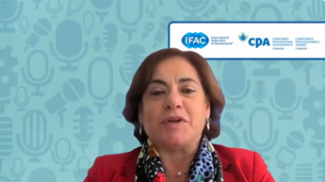
Gabriela Figueiredo Dias, Chair of IESBA, in her keynote address, said: “It’s important to understand whistleblowing’s role in IESBA’s International Code of Ethics, and more precisely the role it plays and the place it occupies in IESBA’s NOCLAR standard – the groundbreaking standard that deals with professional accountants’ responsibilities to respond to non-compliance with laws and regulations.”
“Governments, legislators, and regulators are uniquely placed to introduce or strengthen legislation or regulation governing the reporting of NOCLAR, appropriately tailored to their national circumstances, including establishing appropriate protections for whistleblowers. All participants in the reporting chain, especially management and those charged with governance, have an important role to play,” she concluded.
Image
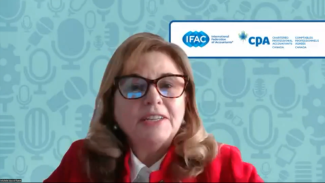
Michele Wood-Tweel, Vice-President, Regulatory Affairs at CPA Canada, underlined the need to respect diversity in national whistleblower protection frameworks.
“Our new report shows that one size does not fit all, as whistleblower protection has to fit into the existing legislative and regulatory framework of each jurisdiction,” she noted.
Image
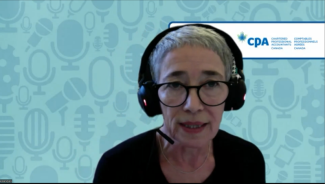
In summarizing the key points of the report, Anna Myers, Executive Director of Whistleblowing International Network (WIN), and author of the report, delved into the broad underlying purpose of whistleblower protection.
“Whistleblower protection is meant to ensure the free flow of credible information to exercise authority responsibly – it is about strengthening institutional and democratic accountability. Then clearly – the question becomes what arrangements and protections are needed to ensure the free flow of information,” she explained.
Motivations for recent progress
Understanding Whistleblower Protection: Laws, Practices, Trends and Key Implementation Considerations highlights the exponential growth in whistleblower protection frameworks around the world. Sixty jurisdictions now have dedicated whistleblower protection laws; the number of jurisdictions with dedicated whistleblower protection laws have grown by half in just the past five years.
Image
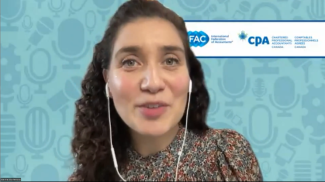
For Martha Monterrosa, Anti-Corruption/Legal Analyst at the OECD, “Corruption and foreign bribery scandals can precipitate legal reforms, and many transnational corruption cases have put the spotlight on the role of whistleblowers in promoting the public interest.”
“International standards and multilateral instruments -- such as the OECD 2021 Anti-Bribery Recommendation, the EU Whistleblower Directive, and other international conventions -- have been major drivers in changing the legislative landscape,” she added.
Image
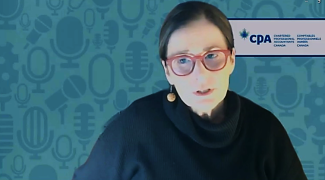
Laura Valli, Board Member of the Italian National Anticorruption Authority (ANAC) and Chair of the Network of European Authorities for Whistleblowing and Integrity (NEIWA), agreed that there is a scandal-driven component to new legislation, but pointed out that its development is nevertheless “mainly part of the progressing interest for anticorruption strategies around the world,” citing the European Union’s Directive on the protection of whistleblowers and its main achievements, from anticorruption tools to human right components.
They however both noted that the implementation of standards remains a challenge for many jurisdictions. “There is on the one hand a gap between legislative achievements and practical application of the law, and cultural resistance to whistleblowing on the other. Whistleblowing has always an ethical and a political component,” reiterated Laura Valli.
Strengthening whistleblower protection globally
Speakers highlighted that ethical concerns and financial misconduct are not confined to specific regions or jurisdictions and confirmed that we need to do more to strengthen whistleblower protection globally, indicating some of the steps we can take.
Martha Monterrosa stressed that whistleblowers are an important source of information for foreign bribery as well as corruption cases, often providing pivotal evidence for the investigation and prosecution. This is why “expanding and enhancing our standards such as the 2021 OECD Anti-Bribery Convention -- which provides extensive guidance on whistleblower protection, as well as appropriate remedies and sanctions -- based on new trends, challenges and realities, is critical to ensure a coordinated and efficient fight against foreign bribery.”
“Some countries have adequate legislation but, in practice, we often see shortcomings related to the culture around reporting. This requires looking at the effective institutional framework in place, and working with multiple stakeholders, including law enforcement, parliamentarians, civil society, and investigative journalists,” she noted.
Image
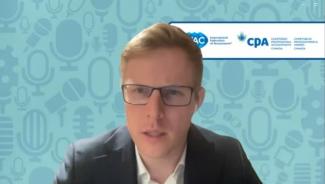
Kieran Pender, Senior Lawyer at the Human Rights Law Centre explained that there are 3 different levels of action:
“At a jurisdictional level, I see three priorities: first an independent statutory body to protect and empower whistleblowers; second an important role for civil society in providing support to whistleblowers; and third, ongoing law reform”, he indicated.
He also recommended for the regional level “an increased focus on best practice and raising the bar on law and implementation,” and, at global level, “harmonization and learning from each other.”
Improving whistleblower protection dialogue & fostering a community dedicated to upholding accountability and integrity
There was a strong agreement that improving whistleblower protection dialogues must be a common endeavor in order for all parties to learn from each other.
“Improving the ongoing whistleblower protection dialogue should focus on practical application of whistleblowing laws and should include civil society, private sector, unions,” Laura Valli explained -- a point that was endorsed by the other speakers.
“We need to see whistleblowing as a perishable gift. How will we - as leaders - be informed and address indications of misconduct, and protect the people that gift us these early warning indications? Do we wish to remain willfully blind or just simply out of touch?” questioned José R. Hernandez, CPA, CA, Ph.D., Chief Executive Officer at Ortus Strategies AG.
Image
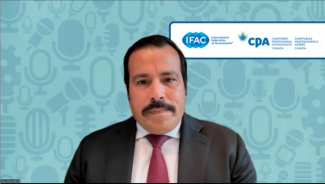
“These are not theoretical but practical debates. The dialogue between government, business and society should be about building a speak-up culture, with due protections, and having mechanisms to respond appropriately,” he added.
Anna Myers stressed that people usually know when something is going wrong, but they do not necessarily know which law or policy it breaches. “So, you do need to ensure that the range of information that is protected under whispering laws are fairly wide and in the public interest,” she noted.
What more could professional accountants do to support a “speak-up” culture in organizations?
“Accountants need to walk-the-talk, encouraging those around them to speak up,” said José Hernandez. “They can ensure the organizations they work in have an anonymous whistleblower system, with adequate mechanisms to investigate complaints. This should be seen as an important element of controls and leadership.”
“The report demonstrates the value of having proactive professional associations--and in particular the accounting profession, which is a key stakeholder in the fight against corruption-- that recognize the need to encourage their members to be leaders in promoting whistleblower protection initiatives,” noted Martha Monterrosa.
Kieran Pender stressed that “lawyers, accountants, auditors, risk, and compliance professionals are on the front line of identifying and addressing wrongdoing of all kinds in both private and public sector around the world. This is why relevant professional stakeholders, such as IFAC, the International Bar Association and national equivalents, have to play a leading role in helping devising systems and legal structures to incentivize accountability and integrity – such as the ‘qui tam’ model in the US”.
IFAC call for action
Image
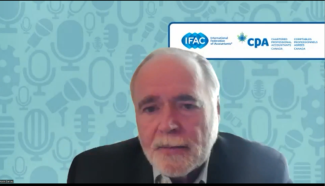
IFAC CEO Kevin Dancey closed the webinar with a call for action to the accountancy profession worldwide:
- Demonstrate your commitment to the public interest by actively engaging in whistleblowing-related policy discussions in your jurisdictions;
- Promote the adoption of effective whistleblower channels across organizations, governments, and not-for-profit entities, as an integral element to promote ethical and responsible behavior and business;
- Let our collective commitment be to cultivate a culture where silence is replaced by the courageous voices of those who uphold the principles of transparency, accountability, and ethical conduct.
He concluded: “In the accountancy profession's pursuit of truth and ethical conduct, silence is not an option. Whistleblower protection is not merely a legal requirement; it is a moral imperative that transcends statutes and regulations.”
Watch the key recommendations from our speakers
USEFUL RESOURCES
IFAC
- IFAC’s Action Plan for fighting Corruption and Economic Crime
- Global Fight, Local Actions: Anti-Corruption Advocacy Workbook for PAOs
- Exploring the IESBA Code
- AML: The Basics
- Connecting Your Educational Programming to Emerging Trends
- Joint IFAC -Transparency International UK - World Economic Forum’s Partnering Against Crime Initiative publication Understanding Anti-Corruption Reporting
CPA CANADA
- Anti-money laundering policy
- Anti-money laundering resources
- Beneficial ownership transparency: International approaches and views from the accounting profession
- A Governance Framework for Anti-corruption and Responsible Business
- Episode 8 Foresight Initiative: The CPA’s role in fighting corruption and money laundering
IESBA
- International Code of Ethics for Professional Accountants
- NOCLAR- Responding to Non-Compliance with Laws and Regulations | Ethics Board
OECD
- Convention on Combating Bribery of Foreign Public Officials in International Business Transactions
- Committing to Effective Whistleblower Protection
- Bribery and corruption awareness handbook for tax examiners and tax auditors
WIN
- WIN resources hub
- Are Whistleblowing Laws Working? A Global Study of Whistleblower Protection Litigation
IBA
- International Bar Association and Government Accountability Project report Are Whistleblowing Laws Working? A Global Study of Whistleblower Protection Litigation
